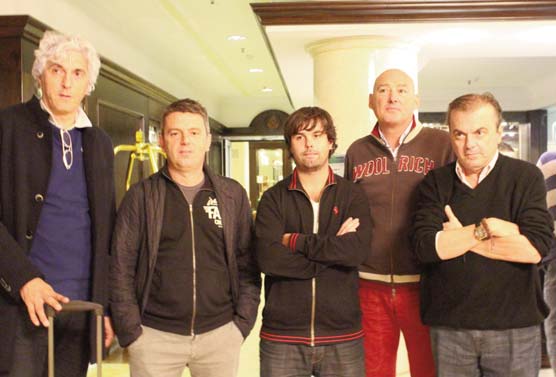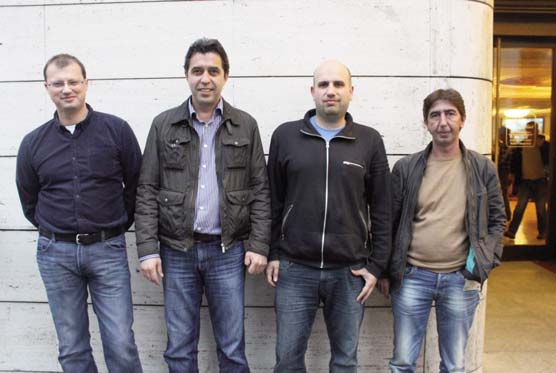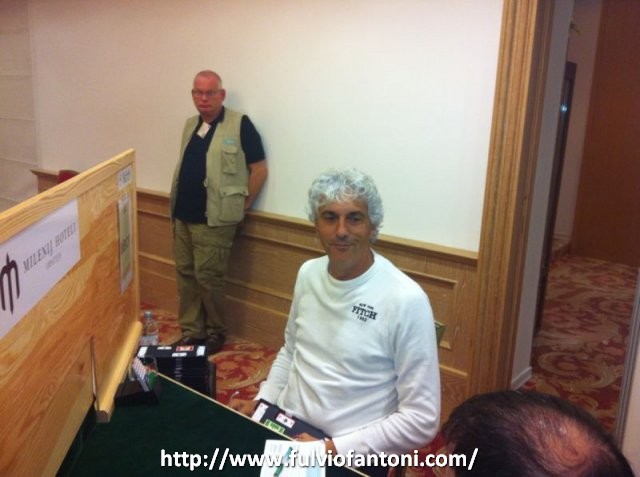[ilink url=»http://www.eurobridge.org/repository/competitions/13Opatija/microsite/Information.htm»]12th European Champions’ Cup Official Site[/ilink]
Sunday November 17: Source for BDI ONLINE by  Maurizio Di Sacco
Maurizio Di Sacco
Allegra 2013 Champion: Maria Teresa Lavazza (pc), Norberto Bocchi, Giorgio Duboin, Guido Ferraro, Agustin Madala, Antonio Sementa, Giancarlo Astore
 ALLEGRA team played better than their unfortunate opponents (K1), ensuring their third consecutive victory, and with it they are awarded with the Roma Cup which is awarded to the three times winner of the Champions Cup, the Angelini team had won the trophy twice, thanks to six wins in the twelve events in which the trophy was made available to participants.
ALLEGRA team played better than their unfortunate opponents (K1), ensuring their third consecutive victory, and with it they are awarded with the Roma Cup which is awarded to the three times winner of the Champions Cup, the Angelini team had won the trophy twice, thanks to six wins in the twelve events in which the trophy was made available to participants.
Allegra always had the lead, Bulgarians sportingly played the final set, to los for more than 100 IMP. Final score 171-62. At the same time, Reggio Emilia lost the battle for the bronze against the team of Wroclaw, Poland. Monaco stick with some initial difficulty in fifth place at the expense of Bareket (ISR), while the British Hinden passed quietly into German Bamberger Reiter.
 |
 |
|
 – Bronze Medal |
 5th Place |
Read about Two Hands from the final:
- [ilink url=»http://csbnews.org/new/?p=39536″]Bending the Spoon…in the European Champions Cup 2013[/ilink]
- [ilink url=»http://csbnews.org/new/?p=39493″]Crime and Punishment in the 2013 European Champions Cup[/ilink]
Saturday November 16: Final :  Allegra vs
Allegra vs  K1
K1
Allegra: Maria Teresa thLavazza (pc), Norberto Bocchi, Giorgio Duboin, Guido Ferraro, Agustin Madala, Antonio Sementa, Giancarlo Astore
K1: Ivan Nanev (pc), Victor Aronov, Diana Damianova, Rossen Gunev, Julian Stefanov
The most exciting of the two main semifinals no doubt was the one between Reggio Emilia and Bulgaria K1. In the first segment, the Italians took an early lead which they lost as the segment went on, trailing by four IMPs after 16 boards. In the second segment, the Italians recovered well to take a 19-IMP overall lead with 16 boards to play. Over the first ten boards of the final segment, the Bulgarians just recovered 5 IMPs on a partscore swing but then, Nanev and Gunev stole a slam missing an AK combination. They followed this with a series of good partscores on which they registered another number of small swings so with three boards to play, they managed to level the scores.

After that, it turned out that their remaining three partscore results were good enough to emerge victorious in the end by a margin of 6 IMPs, even though there was a thin game on for them on the final board . The other semifinal, between GS Allegra, the holders, and Poland’s Rch team from Wrocław was less exciting. The Italians took an early lead and, although the Poles came back to within 10 IMPs of their opponents from time to time, the Italians managed to increase the margin again every time they were threatened. When Madala found the killing lead against a slam, ten boards from the end, it looked all over though the Poles hit back immediately with a thin slam making their way. On the remaining boards, the Italian consistency in the partscore battles saw them home easily enough in the end, winning by 39 and thus creating an interesting final against the runners-up from their Round Robin group.

Friday November 15th: After the first two days of competition just ended the qualifying stage. From the beginning, the teams were divided into two groups and the top two of each group will meet tomorrow for the Cup semifinals (At the end of the round-robin qualifier the first two ranked teams will play a knockout match of 48 boards (3 sessions of 16: 1st A v. 2nd B – 1st B v. 2nd A) in Semi-final A, the third and fourth in Semi-final B (3rd A v. 4th B – 3rd B v. 4th A) and the fifth and sixth in Semi-final C (5th A v. 6th B – 5th B v, 6th A)).
Probably the biggest upset of these two Round Robins was the elimination of the Monaco team even before the final round started. In Group A, GS Allegra from Turin, Italy, had been causing havoc all over group A, finishing with over 86 VP from a possible 100. The only team to keep up with the Italians’ pace was the other qualifying team, Bulgaria’s K1. Though they too, lost to Allegra, this happened at a time
when both teams were already sure of making it to today’s semis. In group B, we had real drama in the end. The leaders
before the final round, Reggio Emilia, had to play the Poles who were 1.9 VP behind them. The Russians, who were 0.24 VP behind the Italians, had to play the Dutch who were 6,51 VP behind the Russians. So whoever would score a comfortable enough win, would go through. As it happened, the Reggio Emilia v. Ruch Wrocław match ended in a tie so the Italians were certainly through. The Poles, whoever, had to wait for the result of the other match: a big win by either team in that match would see the winners through at the expense of the Poles. On the penultimate board of that match, the Dutch scored a big swing to lead by 13.20 to 6.80 VP which would not be enough to see either of them through, as the Russians were now 1.64 VP behind the Poles but still 0.11 VP ahead of the Dutch. When the last board proved a push, this also became the final outcome in group B. It thus would be:
Reggio v. Bulgaria K1 and GS Allegra v. Wrocław for the semifinals.
|
|
|||||||||||||||||||||||||||||||||||||||||||||||||
The European Champions’ Cup (ECC) in its present form started in 2002. It is an annual competition pitting the national club champions from the top ten countries in the previous European Teams Championships against each other. Those NBOs lacking a national inter-club competition may be represented by the winner of its most prestigious team event.
A similar event was tried from 1979 to 1988 in the form of the Europa Cup. The main difference was that the latter involved a team from each member country, resulting in most of them sending their national team. This was seen as defeating the purpose of the event. With the present more limited format this problem is largely avoided.
Format and Rules
The teams are divided into two groups of six and in each group a complete round-robin qualifier of 20 boards will be played. At the end of the round-robin qualifier the first two ranked teams will play a knockout match of 48 boards (3 sessions of 16: 1st A v. 2nd B – 1st B v. 2nd A) in Semi-final A, the third and fourth in Semi-final B (3rd A v. 4th B – 3rd B v. 4th A) and the fifth and sixth in Semi-final C (5th A v. 6th B – 5th B v, 6th A).
The winners of Semi-final A will play a 48-board final (3 sessions of 16) to determine the title; the losers will play a 32-board playoff (2 sessions of 16) for the third place; the winners of the Semi-finals B and C will play 32 board matches (2 sessions of 16), respectively, for fifth and ninth places; the losers of these Semi-finals will not be involved in further play. The EBL Open Teams Championship Rules & Regulations will be applied to the Champions’ Cup. HUM Systems are not allowed.
Participants & Group A & Group B BBO schedule Click here
Past Winners
| Year | Event | Venue | Winners |
| Open | |||
| 2012 | 11 | Eilat, Israel | G.S. ALLEGRA |
| 2011 | 10 | Bad Honnef, Germany | G.S. ALLEGRA |
| 2010 | 9 | Izmir, Turkey | ONSTEIN – NED |
| 2009 | 8 | Paris, France | ANGELINI – ITALY |
| 2008 | 7 | Amsterdam, Netherlands | PARIOLI – ITALY |
| 2007 | 6 | Wroclaw, Poland | PARIOLI – ITALY |
| 2006 | 5 | Rome, Italy | BBC – GERMANY |
| 2005 | 4 | Brussels, Belgium | PARIOLI – ITALY |
| 2004 | 3 | Barcelona, Spain | PARIOLI – ITALY |
| 2003 | 2 | Rome, Italy | PARIOLI – ITALY |
| 2002 | 1 | Warsaw, Poland | ITALY |


